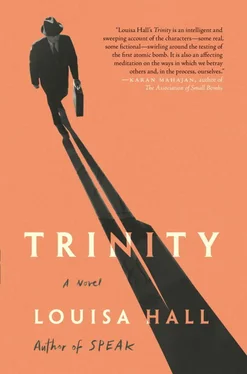Sometimes, I tried on the dresses I kept in our closet, and enjoyed cinching the belts tighter and tighter, because by the time Stan’s classes started in August, I was 112 pounds, and I’d begun to feel very light.
Sometimes, I didn’t get dressed until noon. I didn’t make any friends. At night, I made dinner and watched Stan while he ate it.
AS THE SEMESTER PROGRESSED, I BEGAN TO TAKE MORE AND MOREpleasure in cooking dinner and watching while Stan demolished every last bite.
He had no need, I observed, to notice whether or not other people were eating. At dinner, Stan looked to nobody else for permission as to whether he should put food in his mouth.
He ate with pure, simple pleasure, with no apparent feelings of guilt about eating with so much abandon in front of a girl whose sister had recently died.
He seemed to have forgotten, in fact, that my sister had died of not eating.
He seemed to have forgotten I’d ever had a sister to start with. He never mentioned it once. He simply felt hungry at dinner, and that he therefore deserved a full meal, and a wife to listen to him while he ate it.
Then the pounds began to really fall off. By the end of September, my skirts hung loose on my hips.
Then I was 108 pounds, and my weight was going down some each morning.
IF STAN NOTICED THE CHANGE THAT WAS OCCURRING IN MY PHYSICALperson, it didn’t perturb him.
He accepted my transformation. He never stopped eating, for instance, to ask when my hip bones had begun to jut out, or why I bought that scale, or how I’d come to love cooking.
None of it really surprised him. He’d always expected, I think, that the world would reward him for his decency and his patriotism and his hard work.
So it was in accordance with his expectations that the world provided a thinner wife who began to love cooking. Every day the world rewarded him more, until one day, finally, Stan suffered a setback.
It was in the middle of his first semester that Stan came home with a bewildered expression.
He hadn’t received his graduate stipend. He’d thought it had been some correctable error. But when he went to the financial aid office, he was told he’d been mistaken to think he was getting a stipend.
The officer assigned to Stan’s case pulled out his file, examined it closely, then made some comment about immigrants and their children bleeding the university dry.
When Stan responded in protest, the officer showed him several pages of detailed statistics that had been collected on the criminal nature of Sicilians, and the lesser intelligence of the Irish, and Stan left the office without receiving his stipend.
When he came home and reported all this, he seemed ready to cry.
I felt for him when he told me. Poor Stan. He’d been so hopeful. He’d imagined it was all working out in his favor. It hurt me to see that his hopes had been so thoughtlessly dashed, to watch him come to the edge of the optimism and the sweetness he’d so amazingly managed to maintain all these years, so therefore I jumped in to help him.
I told him I’d go to work, to pay for the rest of his graduate studies.
Then Stan began to cheer up. By the time I brought out his butterscotch pudding, the setback had managed to reverse itself nicely.
There Stan sat, spooning his pudding into his mouth, completely unaware that I wasn’t helping out of the spirit of wifely devotion.
He had no idea that I was helping him not out of love but in the name of a cruel and simple aesthetic.
By then I was disappearing so quickly. I was whittling myself away in the spirit that had infected my sister as well, the cruelty of simply snipping the thread, and it wasn’t Stan’s fault that he missed it.
There he was, doing everything right, accomplishing the things he was meant to accomplish, and no one ever told him that in addition to accomplishing things, he also had to stop and notice the changes that were occurring inside other people.
So he accepted when I offered to work, and then he finished his pudding, and then he took me to bed and I let him, though by then I’d stopped feeling much when he was moving inside me.
THE NEXT DAY, I STARTED LOOKING FOR JOBS. I HADN’T FINISHED MYmarriageable bachelor’s degree, but I could type well, and I dressed neatly and had my mother’s complexion, so a few days after I started looking, I found a secretarial job, filling in for a girl who’d gotten pregnant.
The job was in the office of the director of the Institute for Advanced Study, which is how I met Robert, and how he came to tell me his story.
That was October of 1952. It was still a year and a half before his security hearings, and he was the chairman. I typed his letters, and filed his papers, and generally oversaw his busy schedule, which obviously left me no time for my writing.
AS SOON AS I STARTED, I FOUND THAT I ENJOYED THE POSITION. Iliked mindlessly typing, and answering the telephone. I liked to be too busy to think.
In those days, in addition to his work at Princeton, Robert was serving on the General Advisory Committee of the Atomic Energy Commission, so he was shuttling back and forth between Washington and New Jersey, giving opinions on thermonuclear testing and the deployment of tactical nuclear weapons, such as those that had been assembled in Okinawa.
Between his advisory role, and his public speeches, and the appearances he made on an increasing number of congressional investigatory committees, he and I were almost manically busy.
He liked to dictate messages while he was walking between various meetings. He always walked very fast, leaning forward, moving on the balls of his feet. Sometimes he was in such a rush that he forgot to put on his coat before leaving the office. Often he forgot to eat. Then suddenly he’d remember, take two bites of a sandwich, then put it down and forget where he’d left it.
Otherwise, he smoked cigarettes. He never stopped smoking, and he never stopped moving, and I followed everywhere in his wake, taking notes for various memos and letters.
At that point, of course, he was still influential. I’d known of him before I worked in the office. When I was at St. Stephen’s, he was on the cover of Life . And even when I was at Princeton—nearly a decade after they dropped those bombs—he was still famous, but by then the tide had started to turn.
Truman’s people saw him as weak. In the months after Hiroshima and Nagasaki, he’d met with Truman and said he felt he had blood on his hands. Truman wouldn’t meet with him after that.
Then Robert started to campaign against the development of the H-bomb. And then Russia started testing atom bombs, and everyone was terrified, and schoolgirls were learning to hide under their desks, and by the time I went to work in Robert’s office at the institute, Eisenhower was running a successful campaign on issues of security in the nuclear age.
By then, McCarthy was on the rise in the Senate, and Robert didn’t present as hard a line about the Soviets as he probably should have. He still occasionally advocated transparency about nuclear secrets, to eliminate the need for an arms race. And at the same time, stories had started to surface about his former connections to the Communist Party.
The Justice Department, for example, had a person who was claiming he’d witnessed Robert at a housewarming event thrown by members of the CP in San Francisco, while Robert was working at Los Alamos. Robert insisted that the guy was a crank, but nevertheless he was nervous. He had gone back to San Francisco, he told me. He’d gone to visit a friend. But he didn’t think he’d gone to that party.
Then it came out that Joe Weinberg, one of Robert’s graduate students, had been caught on a wiretap, talking about the A-bomb with the head of the San Francisco CP. So that worried Robert also, because he feared he’d be called to testify against Weinberg.
Читать дальше












